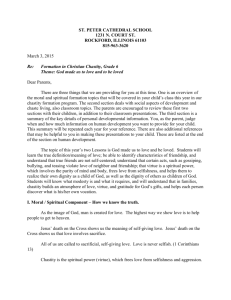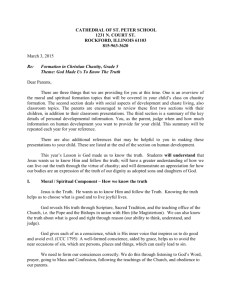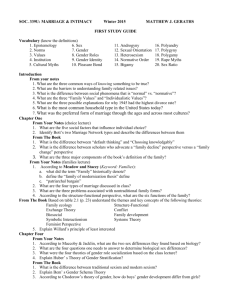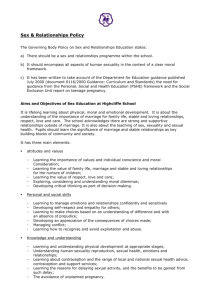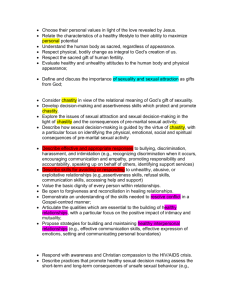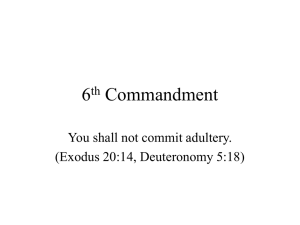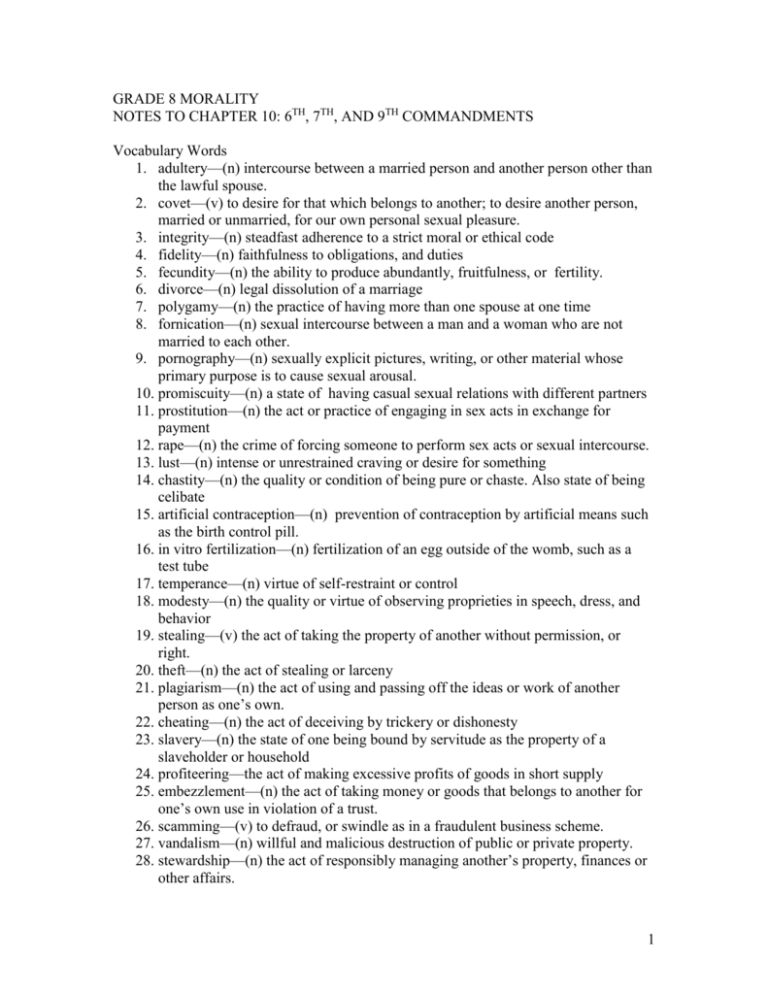
GRADE 8 MORALITY
NOTES TO CHAPTER 10: 6TH, 7TH, AND 9TH COMMANDMENTS
Vocabulary Words
1. adultery—(n) intercourse between a married person and another person other than
the lawful spouse.
2. covet—(v) to desire for that which belongs to another; to desire another person,
married or unmarried, for our own personal sexual pleasure.
3. integrity—(n) steadfast adherence to a strict moral or ethical code
4. fidelity—(n) faithfulness to obligations, and duties
5. fecundity—(n) the ability to produce abundantly, fruitfulness, or fertility.
6. divorce—(n) legal dissolution of a marriage
7. polygamy—(n) the practice of having more than one spouse at one time
8. fornication—(n) sexual intercourse between a man and a woman who are not
married to each other.
9. pornography—(n) sexually explicit pictures, writing, or other material whose
primary purpose is to cause sexual arousal.
10. promiscuity—(n) a state of having casual sexual relations with different partners
11. prostitution—(n) the act or practice of engaging in sex acts in exchange for
payment
12. rape—(n) the crime of forcing someone to perform sex acts or sexual intercourse.
13. lust—(n) intense or unrestrained craving or desire for something
14. chastity—(n) the quality or condition of being pure or chaste. Also state of being
celibate
15. artificial contraception—(n) prevention of contraception by artificial means such
as the birth control pill.
16. in vitro fertilization—(n) fertilization of an egg outside of the womb, such as a
test tube
17. temperance—(n) virtue of self-restraint or control
18. modesty—(n) the quality or virtue of observing proprieties in speech, dress, and
behavior
19. stealing—(v) the act of taking the property of another without permission, or
right.
20. theft—(n) the act of stealing or larceny
21. plagiarism—(n) the act of using and passing off the ideas or work of another
person as one’s own.
22. cheating—(n) the act of deceiving by trickery or dishonesty
23. slavery—(n) the state of one being bound by servitude as the property of a
slaveholder or household
24. profiteering—the act of making excessive profits of goods in short supply
25. embezzlement—(n) the act of taking money or goods that belongs to another for
one’s own use in violation of a trust.
26. scamming—(v) to defraud, or swindle as in a fraudulent business scheme.
27. vandalism—(n) willful and malicious destruction of public or private property.
28. stewardship—(n) the act of responsibly managing another’s property, finances or
other affairs.
1
29. reparation—(n) the act of repairing or compensating for a wrong done.
30. restitution—(n) the act of restoring to the rightful owner something that has been
taken away, lost, or surrendered. Synonymous to reparation.
Q: What is the 6th commandment?
A: You shall not commit adultery.
Q: What is the 9th Commandment?
A: You shall not covet your neighbor’s wife.
Q: Why are we combining the 6th and the 9th commandments in this lesson?
A: Both of these commandments address the issue on how we should properly express
the gift of human sexuality. These commandments guide us to respect our own
relationship as well as that of other people.
Principles that should guide us in using the gift of sexuality wisely:
1. We need to acknowledge and accept our sexual identities.
2. We must respect and honor our sexuality and the sexuality of others. Remember
that even though we are created differently as men and women, we are created in
God’s image and likeness. Men dominating women and vice verse are showing
disrespect to God’s creation.
3. We should look towards a faithful marriage.
4. We should avoid sexual activity performed outside of marriage. This includes
adultery, premarital sex, co-habitation, homosexual relations, and masturbation.
5. We must resist cultural pressures. This includes the media, written or electronic,
which glamorizes illicit sexual behavior.
6. Beware of fantasizing about another person. Fantasizing leads to coveting.
7. Do practice chastity. This includes those who are married to each other. Chastity
guides us to properly expressing our sexuality. Chastity involves the persistent
habit of self-mastery and control of our passions. Married couples must be open to
the possibility of having children; so prevention by contraception or sterilization
to avoid children is against God’s law.
8. We should practice temperance and modesty. Temperance is control of our
passions. Modesty is decency and not showing off our bodies.
Q: What are the main aspects of marriage that form an unbreakable bond?
A: The Church teaches that sexual activity may only occur within marriage. In the
marriage between couples, the bond between unitive (love between spouses) and
procreative (having and raising children) aspects may not be separated. (CCC 2352,
2360, 2363)
Q: Why are adultery, fornication, co-habitation, masturbation, and homosexuality
grave sins?
2
A: These practices that are outside of the marital union are not part of God’s plan. All
these sins are contrary to the virtue of chastity and erode our self-value and the value of
others.
Q: When one performs sex outside of marriage, it is an act of infidelity to whom?
A: Sexuality is ordered to the conjugal love of a man and a woman. Marriage between a
man and woman forms a spiritual covenant which is manifested in their physical
intimacy. Since sexuality is designed by God for marriage alone, any sex outside of
marriage is a form of infidelity to a spouse, to God’s loving care, and our personal
integrity.
Q: What effects can pre-marital and extra-marital sex do to the marriage bond?
A: The marriage bond between a man and a woman is a permanent one. Pre-marital sex
introduces a sense of immoral irresponsibility that weakens one’s preparation for
faithfulness in our future marriage. Extra-marital sex is a direct act of infidelity and
strikes at the heart of the marriage promises.
Q: What does the Church teach in regards to artificial contraception and in vitro
fertilization?
A: In marriage, one must not forget the purpose of marriage: the love between the
spouses, and having and raising children. Artificial contraception seeks to have the sex
without the baby. In vitro fertilization seeks to have the baby without the sex. Both
actions break the unitive-procreative bond. (CCC 2366; 2373-2379)
Q: What does the Church teach about the regulation of births?
A: According to CCC 2368-2372 and the encyclical Humanae Vitae, spouses may space
the births of their children, as long as the motivation is not of a selfish nature, and is in
conformity with responsible parenthood. Periodic continence (Natural Family Planning)
which is a method to which is the only method that is allowed by the Catholic Church.
Q: What good things do we know about learning the 6th Commandment?
A: While sexual sins are vivid reminders of what the 6th commandment is against, there
are virtues that are learned here: fidelity in marriage, chastity, the proper role of sex
meant for marriage alone, the purposes of marriage, and strength in family life. With such
virtues in place, the richer married life will be and the better the environment for the
family with children.
Q: What does the 9th Commandment urge us to do?
A: This commandment urges us to cultivate the virtue of purity and chastity; it opposes
the sin of lust.
Q: What does it mean to be ‘pure in heart?’
A: ‘Pure in heart’ refers to those who have attuned their intellects and wills to the
demands of God’s holiness in the areas of charity, chastity, and love of truth. Chastity
refers to purity in heart, mind, and imagination.
3
Q: To whom does the virtue of chastity apply?
A: Every baptized person is called to live a chaste life, each to his particular state of life:
1) Married people who can have sex must still be chaste in heart, and not to use and
exploit each other; 2) Men and women who have taken vows of chastity and celibacy
must be chaste in heart and abstain from sex; 3) All unmarried people, including widows
and widowers, should also be chaste.
Q: Who is our model for chastity?
A: Jesus is our model for chastity
Q: What are the sins against chastity?
A: Among the sins gravely contrary to chastity are masturbation, fornication,
pornography, and homosexual practices (CCC 2396)
Q: Why is chastity harder to practice today it seems than in the past?
A: It may seem so today because of the sexual permissiveness of today’s culture and the
many messages about sex through the media. But, people of every age have had to deal
with lust and the interior disorder of the passions.
Q: What does the 7th Commandment teach?
A: “You shall not steal.” The 7th Commandment teaches us to remember that all creation
belongs first of all to God our Creator. He is the source of all life, both seen and unseen.
Also, this commandment teaches that God created the world for everyone’s benefit. We
are all made stewards of His creation.
Q: Why is honest work an important part of living according to God’s will?
A: Through work we participate in the very work of God the Creator. Our work is united
to Christ, and because we are united to Christ in our baptism, we give glory and praise to
God the Father.
Q: What is stewardship?
A: Stewardship is managing of and caring for the property of another person, in this
context, God.
Q: In what ways can we show proper stewardship?
A: 1) We have to concern ourselves for the future—let us not waste our natural resources
and deprive future generations of the fruits of the earth
2) We have to be concerned for the poor. We serve Christ when we share our
blessings with the poor and needy.
3) We should be concerned for the common good. We are a global family and must
show responsibility for concern for the whole world
4) We should show concern and be active in public life. We must not be passive
when it comes to matters of justice and welfare of others.
Q: What does it mean when it is said that ‘creation is ours to use, and not to abuse?’
4
A: It is our privilege to care for God’s creation and not to usurp its ownership from God.
Creation is ours to share generously, not hoard selfishly.
Q: Name some forms of stealing.
A: 1) Wage earners who are not given a fair and just wage for their work
2) Deliberately withholding of a lost item by a person who is not the rightful owner.
3) Willfully damaging of something that belongs to another.
4) Cheating on a test, or plagiarizing
5) Discrimination in employment
6) Increasing profits at the expense of others
7) Slavery which reduces the dignity of a person as a commodity or form of property.
Q: What virtues help us keep the 7th Commandment?
A: 1) temperance—indifference or detachment from worldly goods
2) justice—preserves the rights of others and give to others what is due to them
3) solidarity—this is in accordance with the Golden Rule and in keeping with the
generosity of the Lord.
Q: How did Catholic social teaching originate?
A: Developed in the 19th century, Catholic social teaching originated in light of the
modern industrial society with its new structures for production and manufacturing, new
terms of labor and ownership, new concepts of government and authority, and new
economics.
Q: Why are we to love and also help the poor?
A: When we love and help the poor, we are also loving and helping the person of Jesus
Christ, (Mt 25: 35-36). St. John Chrysostom says “Not to enable the poor to share in our
goods is to steal from them and deprive them of life. The goods we possess are not ours
but theirs.” St. Gregory the Great says, “When we attend to the needs of those in want,
we give them what is theirs, not ours. More than performing works of mercy, we are
paying a debt of justice.”
5

